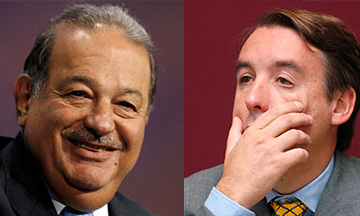
|  |  |  Technology News Technology News  
Mexican Moguls to Face Off in Wireless Industry
 Noel Randewich - Reuters Noel Randewich - Reuters
go to original
February 18, 2010


| | Measured by sales, Emilio Azcarraga's (R) Televisa is far smaller than Carlos Slim's companies. |  |
Mexico City - Two of Mexico's most powerful businessmen are set for a new round of head-to-head competition as the country's television and telephone industries converge following years of lackluster competition.

Tycoon Emilio Azcarraga is barging into Mexico's wireless telephone market with his giant Televisa broadcasting and media empire to challenge America Movil, the flagship telecom holding of Carlos Slim, one of the world's wealthiest men.

Televisa unveiled a deal on Monday to buy a 30 percent stake in wireless operator Nextel Mexico, controlled by NII Holdings Inc (NIHD.O), for $1.4 billion.

The money Televisa is paying for the share in Nextel Mexico would be used by Mexico's No. 4 wireless operator to bid for spectrum in auctions that are at the center of a government plan to heat up lukewarm competition in the telecom industry.

"It's going to be two mammoths fighting each other. Hopefully the winner will be the consumer," said Edgar Amador, an independent financial analyst in Mexico City.

Motorcycle-riding Azcarraga's Televisa controls most of Mexico's television programing, while Slim's companies heavily dominate the telephone industry. Both tycoons, former business partners who still co-own a discount airline, have fought in recent years to hold onto their power.

The two moguls already compete in fixed-line and Internet services. Their new battleground will be the "quadruple play" wireless sector, in which companies want to bunch fixed-line, cellphone, Internet and TV content in one package.

Azcarraga was just 29 when he became head of Televisa (TLVACPO.MX) (TV.N), the world's largest Spanish-language media company, in the late 1990s.

Now 41 and worth around $1 billion according to Forbes, he has expanded its empire to include three professional soccer teams, a gambling chain, publishing companies, satellite television, cable operators and music distributors.

"Content. That's the key in Televisa coming into this market," Amador said. "That's what Slim lacks, and it's what he's been searching for and trying to develop for years."

Slim acquired creaking telephone monopoly Telmex (TELMEXL.MX) from the government in 1990, shook it up and expanded it across Latin America. From fixed-line operator Telmex, he spun off America Movil (AMXL.MX), which went on to become the region's largest cellphone operator.

Telmex controls 80 percent of Mexico's fixed-line market and America Movil has more than 70 percent of the wireless market, with Spain's Telefonica (TEF.MC) a distant second.

Cable operations owned by Televisa have already started offering fixed-line and Internet services, luring clients from Telmex.

SLIM BIGGER BUT LACKS CONTENT

Slim, 70, is likely worth $59 billion, thanks largely to his telecom empire, putting him in competition with Microsoft Corp (MSFT.O) founder Bill Gates for status as the world's richest man, according to Sentido Comun financial website editor Eduardo Garcia, a respected Mexican wealth tracker.

Measured by sales, Televisa is far smaller than Slim's companies, but the broadcaster's 75-percent television market share gives it massive influence in everything from election campaigns to launching the careers of pop stars.

Being able to offer "quadruple play" bundles over wireless networks will give Televisa an advantage over Slim's Telmex, which for years has been prohibited from launching TV services as smaller competitors establish themselves.

"The media are the most powerful companies," Slim told journalists in 2008. "I don't see what power we have if we're not allowed to provide television."

In January, Slim launched a $21 billion proposal to shift control of Telmex and his regional fixed-line operator Telmex Internacional into America Movil. As Latin American competition heats up, he wants to integrate his companies to create a provider with fixed-line phone, mobile and Internet services across Latin America to better challenge rivals.

As the government also prepares to tender a new fiber-optic network in Mexico, Televisa may make more acquisitions to raise its stake in the telecommunications industry, said Ernesto Piedras, head of consulting firm The Competitive Intelligence Unit.

"We're barely watching the first or second round. This fight is nowhere near over," Piedras said.

(Editing by Gerald E. McCormick)
|

 |
|  |



